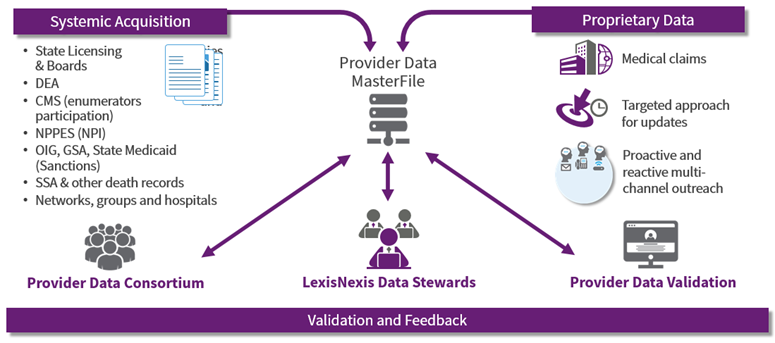Leading Database Providers for High-Performance Applications
Leading Database Providers for High-Performance Applications
Blog Article
Trick Features to Seek When Choosing a Data Source Service Provider
Choosing a database company is a critical decision that can significantly affect your company's data and operations monitoring strategy. Amongst the important attributes to think about are scalability choices, which make sure that your system can adjust to growing needs.
Scalability Options
When choosing a data source copyright, recognizing scalability choices is essential to making sure that the selected remedy can suit future development. Scalability describes the ability of a database system to increase its capability and efficiency in feedback to boosted need. There are 2 main kinds of scalability: straight and upright.
Upright scalability, or "scaling up," involves improving a solitary server's resources, such as CPU, RAM, or storage. This strategy can be affordable and straightforward for smaller applications however may get to a limitation where even more upgrades are as well pricey or impractical.
Horizontal scalability, or "scaling out," includes including a lot more servers to distribute the lots. This strategy permits greater flexibility and can suit substantial boosts in data volume and user website traffic (database provider). It is specifically beneficial for cloud-based data source services that can dynamically assign sources based upon demand

Safety Measures

When reviewing safety and security actions, consider the implementation of encryption procedures (database provider). Data-at-rest and data-in-transit encryption are important to make certain that delicate info remains safeguarded, even in case of a protection violation. In addition, seek service providers that use solid verification mechanisms, such as multi-factor verification (MFA), to additionally boost accessibility control
Routine safety audits and conformity with market requirements, such as GDPR or HIPAA, are a sign of a service provider's commitment to information defense. Additionally, make inquiries concerning their incident reaction plan; a robust strategy can lessen the effect of any type of potential safety event.
Efficiency Metrics
Examining efficiency metrics is important for organizations to make sure that their chosen database copyright meets functional requirements. Secret performance metrics include feedback throughput, scalability, and time, which collectively determine the performance of database procedures under varying tons.
Action time is critical, as it reflects just how quickly the data source can process inquiries and return outcomes. Organizations needs to try to find metrics that show average reaction times throughout optimal and off-peak hours. Throughput, usually gauged in purchases per second (TPS), gives understanding into the data source's capacity to take care of high volumes of requests without performance degradation.
Scalability analyzes the data source's capability to grow with the company's demands. A robust database supplier need to show upright and straight scaling capabilities, enabling smooth changes as needs rise and fall. Furthermore, understanding latency, especially in dispersed systems, can assist organizations review the responsiveness of the database across various geographical places.
Consumer Support
Reputable consumer assistance is a foundation of reliable data source monitoring, providing organizations with the help required to maximize and resolve issues performance. When picking a database provider, assessing the level of customer support they supply is vital. A durable support group must include numerous channels of communication, such as phone, e-mail, and live chat, making sure that users can access help whenever they require it.
In addition, responsive assistance groups that are offered 24/7 greatly boost the dependability of the database service. Motivate response times and reliable resolution of concerns can considerably reduce downtime and boost total productivity. It is likewise advantageous to take into consideration the availability of committed support employees, that can provide tailored aid based upon an organization's details requirements.

Rates Structure
When thinking about a database company, the pricing framework is an essential variable that can significantly influence a company's spending plan and general strategy. A clear and adaptable pricing click now model is crucial for lining up the database sets you back with organization requirements - database provider. Organizations must evaluate whether the prices is based upon consumption, per customer, or a flat price, as Home Page each model can generate different economic implications in time
It is essential to analyze any type of extra prices connected with the supplier's solutions, such as information storage charges, deal expenses, and assistance charges. Some companies might offer tiered prices, enabling scalability as the organization grows, while others might enforce strict limitations that could come to be costly as data demands increase.
Furthermore, organizations ought to take into consideration the long-lasting worth of the database service. While lower initial prices can be enticing, they may not make up future upgrades, maintenance costs, or assimilation expenses. Conducting a thorough cost-benefit analysis will help identify the most appropriate rates structure that stabilizes scalability, performance, and assistance, inevitably ensuring that the chosen data source provider lines up with the company's functional and financial objectives.
Verdict
In conclusion, choosing a data source copyright demands careful consideration of numerous vital attributes. Assessing efficiency metrics makes it possible for the identification of efficient data sources, and obtainable client assistance enhances the general customer experience.
Selecting a database service provider is a critical decision that can significantly influence your company's operations and data administration approach.When selecting a data source provider, understanding scalability alternatives is important to guaranteeing that the chosen solution can accommodate future growth. When choosing a database copyright, assessing the level of client support they use is important.When considering a database provider, the rates framework is a crucial aspect that can considerably influence an organization's spending plan and total method. find this Conducting a comprehensive cost-benefit evaluation will certainly help determine the most ideal rates structure that stabilizes assistance, scalability, and performance, eventually ensuring that the picked database provider straightens with the organization's functional and monetary objectives.
Report this page